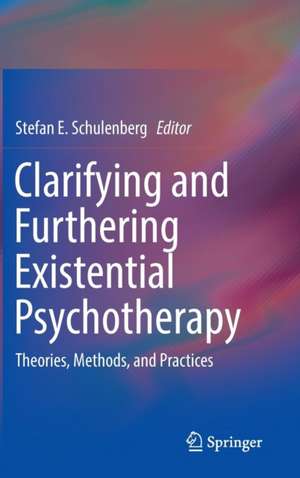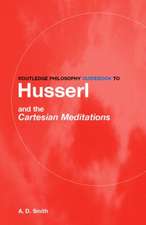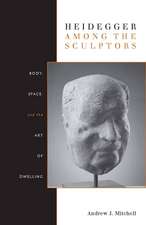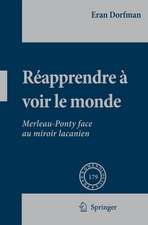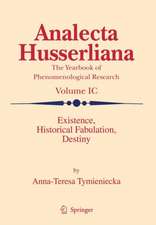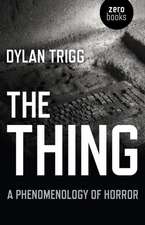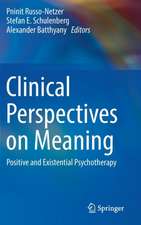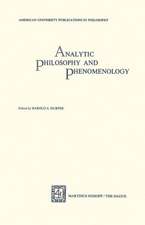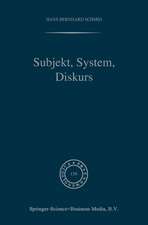Clarifying and Furthering Existential Psychotherapy: Theories, Methods, and Practices
Editat de Stefan E. Schulenbergen Limba Engleză Hardback – 4 oct 2016
Chapters review the evidence for its therapeutic value, and provide updates on education, training, and research efforts in the field, both in the US and abroad. Throughout, existential psychotherapy emerges as a vital, flexible, and empirically sound modality in keeping with the current—and future—promotion of psychological well-being.
Highlights of the coverage include:
- Emotion, relationship, and meaning as core existential practice: evidence-based foundations.
- Experience processing as an aspect of existential psychotherapy: life enhancement methodology.
- Structural Existential Analysis (SEA): a phenomenological method for therapeutic work.
- Experiencing change: an existential perspective.
- Creating the World Congress for existential therapy.
| Toate formatele și edițiile | Preț | Express |
|---|---|---|
| Paperback (1) | 465.15 lei 6-8 săpt. | |
| Springer International Publishing – 14 iun 2018 | 465.15 lei 6-8 săpt. | |
| Hardback (1) | 584.26 lei 6-8 săpt. | |
| Springer International Publishing – 4 oct 2016 | 584.26 lei 6-8 săpt. |
Preț: 584.26 lei
Preț vechi: 687.36 lei
-15% Nou
Puncte Express: 876
Preț estimativ în valută:
111.80€ • 116.72$ • 92.53£
111.80€ • 116.72$ • 92.53£
Carte tipărită la comandă
Livrare economică 05-19 aprilie
Preluare comenzi: 021 569.72.76
Specificații
ISBN-13: 9783319310855
ISBN-10: 3319310852
Pagini: 244
Ilustrații: XII, 161 p. 10 illus.
Dimensiuni: 155 x 235 x 11 mm
Greutate: 0.43 kg
Ediția:1st ed. 2016
Editura: Springer International Publishing
Colecția Springer
Locul publicării:Cham, Switzerland
ISBN-10: 3319310852
Pagini: 244
Ilustrații: XII, 161 p. 10 illus.
Dimensiuni: 155 x 235 x 11 mm
Greutate: 0.43 kg
Ediția:1st ed. 2016
Editura: Springer International Publishing
Colecția Springer
Locul publicării:Cham, Switzerland
Cuprins
Clarifying and Furthering Existential Psychotherapy: Introduction.- Existential Psychotherapy: An International Survey of the Key Authors and Texts Influencing Practice.- Emotion, Relationship, and Meaning as Core Existential Practice:
Evidence-Based Foundations.- The Case for Existential (Spiritual) Psychotherapy.- Engaged Understanding for Lived Meaning.- Meaning-Centered Psychotherapy: A Socratic Clinical Practice.- Experience Processing as an Aspect of Existential Psychotherapy: Life Enhancement Methodology.- Structural Existential Analysis (SEA): A phenomenological method for therapeutic work.- Existential Psychotherapy The Genetic-Phenomenological Approach: Beyond a Dichotomy Between Relating and Skills.- Experiencing Change: An Existential Perspective.- Creating the World Congress for Existential Therapy.
Evidence-Based Foundations.- The Case for Existential (Spiritual) Psychotherapy.- Engaged Understanding for Lived Meaning.- Meaning-Centered Psychotherapy: A Socratic Clinical Practice.- Experience Processing as an Aspect of Existential Psychotherapy: Life Enhancement Methodology.- Structural Existential Analysis (SEA): A phenomenological method for therapeutic work.- Existential Psychotherapy The Genetic-Phenomenological Approach: Beyond a Dichotomy Between Relating and Skills.- Experiencing Change: An Existential Perspective.- Creating the World Congress for Existential Therapy.
Notă biografică
Stefan E. Schulenberg (Ph.D., Clinical Psychology-Clinical/Disaster Specialty Track, University of South Dakota, 2001) is a licensed psychologist in the state of Mississippi, an Associate Professor in the University of Mississippi’s Psychology Department, and a Logotherapy Diplomate. Dr. Schulenberg is the Director of the University of Mississippi’s Clinical-Disaster Research Center (UM-CDRC), an integrated research, teaching, and training center with emphases in disaster mental health and positive psychology.
Dr. Schulenberg’s research interests include disaster mental health, perceived meaning, purpose in life, positive psychology, and psychological assessment. He served as a mental health consultant on a National Science Foundation research grant issued in response to Hurricane Katrina and conducted evaluation research funded by the Mississippi Department of Mental Health relating to the effects of the Gulf oil spill (Deepwater Horizon oil spill). He conducts workshops and provides training on disaster preparedness, psychological first aid, disaster response, meaning and purpose in life, resilience, and posttraumatic growth.
Dr. Schulenberg is a disaster mental health volunteer and supervisor in the American Red Cross, and has worked with various other volunteer organizations, such as Mississippi’s Disaster Response Network, United Way, and the American Foundation for Suicide Prevention. He teaches the graduate cognitive assessment course for the University of Mississippi’s doctoral program in clinical psychology, where he has also developed seminars in disaster mental health and positive psychology. At the undergraduate level, Dr. Schulenberg teaches courses in disaster mental health, positive psychology, psychology and law, and abnormal psychology, as well as sections of the Honor’s Freshman Seminar for the University of Mississippi’s Sally McDonnell Barksdale Honors College.
Dr. Schulenberg’s research interests include disaster mental health, perceived meaning, purpose in life, positive psychology, and psychological assessment. He served as a mental health consultant on a National Science Foundation research grant issued in response to Hurricane Katrina and conducted evaluation research funded by the Mississippi Department of Mental Health relating to the effects of the Gulf oil spill (Deepwater Horizon oil spill). He conducts workshops and provides training on disaster preparedness, psychological first aid, disaster response, meaning and purpose in life, resilience, and posttraumatic growth.
Dr. Schulenberg is a disaster mental health volunteer and supervisor in the American Red Cross, and has worked with various other volunteer organizations, such as Mississippi’s Disaster Response Network, United Way, and the American Foundation for Suicide Prevention. He teaches the graduate cognitive assessment course for the University of Mississippi’s doctoral program in clinical psychology, where he has also developed seminars in disaster mental health and positive psychology. At the undergraduate level, Dr. Schulenberg teaches courses in disaster mental health, positive psychology, psychology and law, and abnormal psychology, as well as sections of the Honor’s Freshman Seminar for the University of Mississippi’s Sally McDonnell Barksdale Honors College.
Textul de pe ultima copertă
This exciting volume brings together leading figures across existential psychology in a clear-sighted guide to its current practice and therapeutic possibilities. Its accessible yet scholarly presentation dispels common myths about existential psychotherapy while demonstrating core methods and innovative techniques as compatible with the range of clinicians’ theoretical orientations and practical approaches.
Chapters review the evidence for its therapeutic value, and provide updates on education, training, and research efforts in the field, both in the US and abroad. Throughout, existential psychotherapy emerges as a vital, flexible, and empirically sound modality in keeping with the current—and future—promotion of psychological well-being.
Highlights of the coverage include:Emotion, relationship, and meaning as core existential practice: evidence-based foundations. · Meaning-centered psychotherapy: a Socratic clinical practice.
Chapters review the evidence for its therapeutic value, and provide updates on education, training, and research efforts in the field, both in the US and abroad. Throughout, existential psychotherapy emerges as a vital, flexible, and empirically sound modality in keeping with the current—and future—promotion of psychological well-being.
Highlights of the coverage include:
- Experience processing as an aspect of existential psychotherapy: life enhancement methodology.
- Structural Existential Analysis (SEA): a phenomenological method for therapeutic work.
- Experiencing change: an existential perspective.
- Creating the World Congress for existential therapy.
Caracteristici
Provides a unique opportunity for discussing the therapeutic potentials of existential psychotherapy Describes existential psychotherapies in a clear manner, with emphasis on applicability to students and clinicians alike, regardless of primary theoretical orientation Points out directions for existential psychotherapy training and practice on an international scale Includes supplementary material: sn.pub/extras
